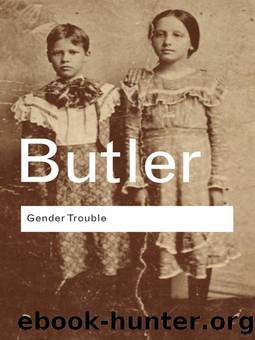Gender Trouble by Judith Butler

Author:Judith Butler
Language: eng
Format: epub
Publisher: Taylor and Francis
Published: 1990-08-14T16:00:00+00:00
3
SUBVERSIVE BODILY ACTS
I. THE BODY POLITICS OF JULIA KRISTEVA
Kristeva’s theory of the semiotic dimension of language at first appears to engage Lacanian premises only to expose their limits and to offer a specifically feminine locus of subversion of the paternal law within language.1 According to Lacan, the paternal law structures all linguistic signification, termed “the Symbolic,” and so becomes a universal organizing principle of culture itself. This law creates the possibility of meaningful language and, hence, meaningful experience, through the repression of primary libidinal drives, including the radical dependency of the child on the maternal body. Hence, the Symbolic becomes possible by repudiating the primary relationship to the maternal body. The “subject” who emerges as a consequence of this repression becomes a bearer or proponent of this repressive law. The libidinal chaos characteristic of that early dependency is now fully constrained by a unitary agent whose language is structured by that law. This language, in turn, structures the world by suppressing multiple meanings (which always recall the libidinal multiplicity which characterized the primary relation to the maternal body) and instating univocal and discrete meanings in their place.
Kristeva challenges the Lacanian narrative which assumes cultural meaning requires the repression of that primary relationship to the maternal body. She argues that the “semiotic” is a dimension of language occasioned by that primary maternal body, which not only refutes Lacan’s primary premise, but serves as a perpetual source of subversion within the Symbolic. For Kristeva, the semiotic expresses that original libidinal multiplicity within the very terms of culture, more precisely, within poetic language in which multiple meanings and semantic nonclosure prevail. In effect, poetic language is the recovery of the maternal body within the terms of language, one that has the potential to disrupt, subvert, and displace the paternal law.
Despite her critique of Lacan, however, Kristeva’s strategy of subversion proves doubtful. Her theory appears to depend upon the stability and reproduction of precisely the paternal law that she seeks to displace. Although she effectively exposes the limits of Lacan’s efforts to universalize the paternal law in language, she nevertheless concedes that the semiotic is invariably subordinate to the Symbolic, that it assumes its specificity within the terms of a hierarchy immune to challenge. If the semiotic promotes the possibility of the subversion, displacement, or disruption of the paternal law, what meanings can those terms have if the Symbolic always reasserts its hegemony?
The criticism of Kristeva which follows takes issue with several steps in Kristeva’s argument in favor of the semiotic as a source of effective subversion. First, it is unclear whether the primary relationship to the maternal body which both Kristeva and Lacan appear to accept is a viable construct and whether it is even a knowable experience according to either of their linguistic theories. The multiple drives that characterize the semiotic constitute a prediscursive libidinal economy which occasionally makes itself known in language, but which maintains an ontological status prior to language itself. Manifest in language, in poetic language in particular, this prediscursive libidinal economy becomes a locus of cultural subversion.
Download
This site does not store any files on its server. We only index and link to content provided by other sites. Please contact the content providers to delete copyright contents if any and email us, we'll remove relevant links or contents immediately.
On the Front Line with the Women Who Fight Back by Stacey Dooley(4307)
The Lonely City by Olivia Laing(4111)
The Rules Do Not Apply by Ariel Levy(3897)
Bluets by Maggie Nelson(3704)
The Confidence Code by Katty Kay(3560)
Three Women by Lisa Taddeo(2915)
Inferior by Angela Saini(2829)
A Woman Makes a Plan by Maye Musk(2824)
Pledged by Alexandra Robbins(2788)
Not a Diet Book by James Smith(2715)
Confessions of a Video Vixen by Karrine Steffans(2668)
Nice Girls Don't Get the Corner Office by Lois P. Frankel(2589)
Wild Words from Wild Women by Stephens Autumn(2584)
Brave by Rose McGowan(2497)
The Girl in the Spider's Web: A Lisbeth Salander novel, continuing Stieg Larsson's Millennium Series by Lagercrantz David(2379)
The Clitoral Truth: The Secret World at Your Fingertips by Rebecca Chalker(2239)
Why I Am Not a Feminist by Jessa Crispin(2235)
Women & Power by Mary Beard(2219)
Women on Top by Nancy Friday(2118)
